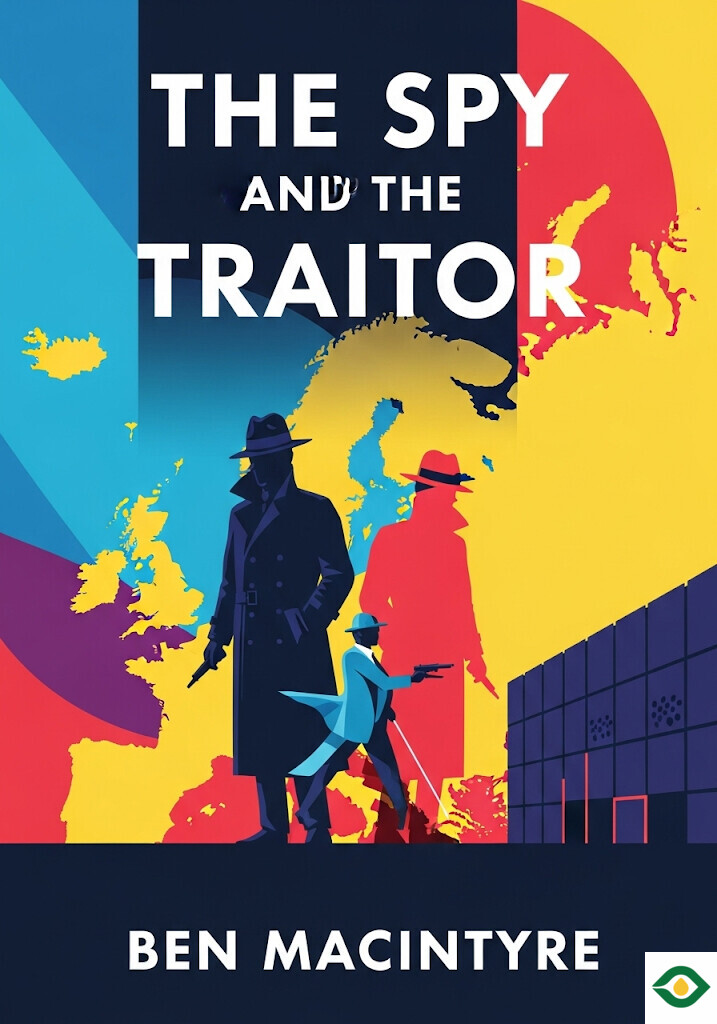Description
The Cold War was a long and tense standoff between the Soviet Union and the West. Both sides lived in fear that the other might start a nuclear war. To stay ahead, they built networks of spies and ran secret operations across the globe. Among these spies was one man whose decisions would change history: Oleg Gordievsky.
Oleg was born into a KGB family in 1938. His father served proudly in the Soviet secret police, wearing his uniform even on weekends. Growing up, it seemed obvious that Oleg and his brother would follow in their father’s footsteps. But while his path looked certain, Oleg’s heart began to drift. He was shaped by his quiet, thoughtful mother and a grandmother who practiced her faith secretly in a country where religion was banned. From an early age, Oleg felt uneasy about communism.
At university, Oleg studied international relations, the training ground for future diplomats and intelligence officers. This was during a brief period of cultural opening in the Soviet Union after Stalin’s death. Foreign magazines and books appeared in libraries, and Oleg secretly tuned into Western radio stations at night. Slowly, he absorbed different ideas about freedom and culture. His friendship with a fellow student, Stanislaw Kaplan, who also doubted communism, reinforced these feelings.
In 1961, Oleg was sent to East Berlin as part of his early training. There, he witnessed the Berlin Wall being built. To him, it was not a defense but a prison wall, meant to trap East Germans inside. The sight shook him. He returned to Moscow for full KGB duty but carried with him a deep sense of disillusionment. To gain a foreign posting, he married Yelena, and by 1966 they were stationed in Denmark.
Life in Copenhagen opened Oleg’s eyes wider. He read Western books, listened to music, and soaked up a culture far freer than his own homeland’s. He despised how the Soviet Union crushed democratic movements like the Prague Spring in Czechoslovakia. He even tried to send signals to Danish intelligence that he was ready to cooperate, but they missed his hints. The British, however, were paying attention.
In 1970, Oleg returned to Moscow, disappointed that no one had reached out. But British intelligence, MI6, already had him marked as a possible recruit thanks to Kaplan’s earlier testimony. A few years later, when Oleg was back in Denmark, MI6 finally made contact. At first cautious, Oleg eventually agreed to work with them. He became a double agent: still a KGB officer, but secretly feeding crucial information to the British.
Oleg was not an ordinary spy. He rose high within the KGB, gaining access to secrets that few others could. He smuggled out microfilm, shared Soviet strategies, and gave the West an understanding of how the KGB worked. For MI6, he was a dream come true—intelligent, loyal, and perfectly placed. His work was so valuable that the head of MI6 personally sent him a thank-you note.
While his professional life grew more dangerous, his personal life was complicated. His marriage with Yelena broke apart, and he later fell in love with Leila, the daughter of a KGB general. They married and had children, but Oleg could never share with her the truth of his secret double life.
By the early 1980s, Oleg secured a posting in London. This was a turning point. He was able to provide insights into Soviet psychology, explaining to Western leaders how terrified the Soviets were of a surprise nuclear strike. This knowledge helped prevent dangerous misunderstandings. For example, he advised Margaret Thatcher on how to interact with Soviet leaders—showing friendliness rather than harshness to avoid pushing them into paranoia. His information also helped the Americans soften their rhetoric during the tense years of Ronald Reagan’s presidency.
But being a double agent was always risky. In 1985, Oleg was suddenly recalled to Moscow. The KGB suspected something, though they could not prove it. He was interrogated and drugged but refused to confess. Unknown to him, a CIA officer named Aldrich Ames, who was secretly working for the Soviets, had betrayed him. For a while, Oleg lived under heavy suspicion, constantly fearing arrest.
At this point, MI6 decided it was time to act. They had a daring escape plan, code-named PIMLICO. It involved disguises, secret signals, and a risky journey across the border into Finland. When Oleg finally decided to flee, he had to make the heartbreaking choice to leave his wife and children behind, as they refused to come.
The escape itself was straight out of a spy novel. MI6 smuggled Oleg into the trunk of a diplomatic car. At the Finnish border, dogs nearly discovered him, but a quick distraction with potato chips and a baby’s diaper saved the day. Once across the border, he was finally safe. The Cold War’s most important double agent had escaped.
In London, Oleg was free but not whole. He was separated from his family, who remained in the Soviet Union under pressure from the KGB. Years later, after the fall of the Soviet Union, they were finally allowed to join him, though the marriage did not survive. Oleg lived in exile, lonely but respected. He wrote books, gave lectures, and received honors, including recognition from the Queen.
Oleg Gordievsky’s story is not only one of espionage but also of conscience. He grew up inside the Soviet system yet chose to risk everything because he believed in freedom and truth. His intelligence work helped prevent misunderstandings that could have led to nuclear war, and his courage shaped the end of the Cold War.
In the quiet suburbs of London, protected by MI6, he still lives as a reminder of how one person’s choices can alter the course of history. The spy who betrayed his own side did not do it for money or revenge, but because he believed the truth mattered more than obedience. His story shows how even in the darkest times, individuals can make decisions that protect peace and change the world.





